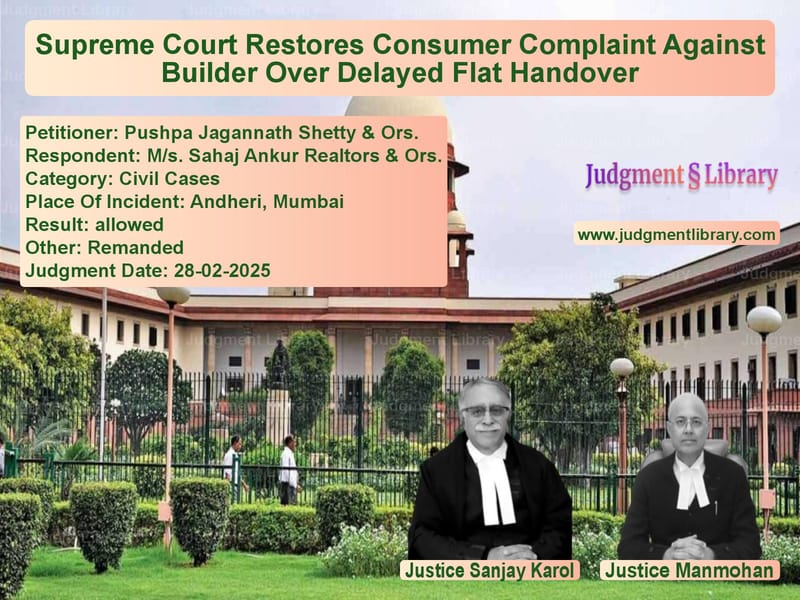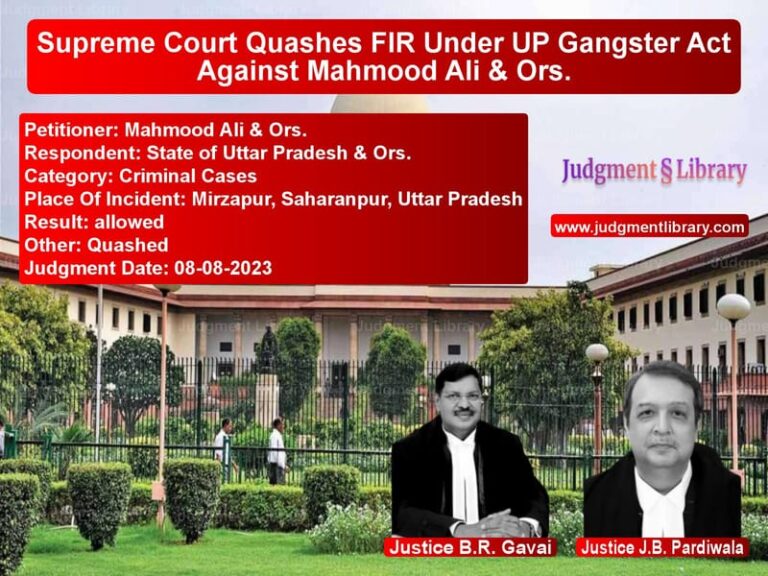Supreme Court Restores Consumer Complaint Against Builder Over Delayed Flat Handover
The Supreme Court of India has delivered a crucial judgment in the case of Pushpa Jagannath Shetty & Ors. v. M/s. Sahaj Ankur Realtors & Ors., reinstating a consumer complaint against a builder who failed to deliver flats on time. The ruling clarified the application of limitation in consumer disputes and emphasized the rights of homebuyers.
Background of the Case
The case arose from a dispute over a redevelopment project in Andheri, Mumbai, where the appellants were tenants in an old building named ‘Madhav Baug’. The respondents, a real estate firm, undertook to demolish the structure and provide the tenants with alternate accommodation in a newly constructed building.
A Permanent Alternate Accommodation Agreement was executed on September 20, 2013, stipulating that the new flats would be delivered within 24 months from the commencement certificate date, with a grace period of 6 months. However, the construction was not completed within the stipulated time.
Subsequently, on January 10, 2015, an Indemnity-cum-Undertaking was executed, promising two alternate flats (301 and 302) free of cost if necessary approvals were not secured within six months. When the builder failed to fulfill its obligations, the appellants sought compensation.
Claims and Reliefs Sought
On February 6, 2019, the appellants filed a complaint before the National Consumer Disputes Redressal Commission (NCDRC), seeking:
- Allotment and registration of flats 301 and 302 with parking spaces.
- Compensation of ₹4.59 crore, comprising market value and additional 25% compensation.
- Restriction on the builder from selling or alienating the flats.
- Payment of ₹51,537 per month from January 2019 until the case was decided.
- Arrears of ₹2.5 lakh plus interest.
Arguments Presented
Petitioners’ Arguments
The appellants contended:
- The builder failed to honor its contractual obligations under the 2013 agreement and the 2015 indemnity.
- They had been pursuing their claims through letters and meetings, leading to delays.
- The limitation period should be counted from the last correspondence and not from the failure to deliver flats in 2015.
- The NCDRC erroneously dismissed the complaint as time-barred, ignoring the ongoing negotiations.
Respondents’ Arguments
The builder argued:
- The complaint was time-barred, as the cause of action arose in July 2015 when the six-month period under the indemnity agreement expired.
- No fresh cause of action arose in 2018 or 2019 that could extend the limitation period.
- The buyers already took possession of the escrowed flats, nullifying their compensation claim.
Supreme Court’s Observations and Ruling
The Supreme Court found that the NCDRC erred in dismissing the complaint on limitation grounds.
Key observations by the Court:
- “The ongoing discussions and attempts to secure possession constitute a continuing cause of action.”
- “When parties actively engage in negotiations, the limitation period does not run strictly from the initial breach.”
- “Limitation, while important, should not defeat substantive rights, particularly when efforts to enforce contractual obligations are evident.”
- “The complaint is within time and must be decided on merits.”
Final Judgment
The Supreme Court set aside the NCDRC’s dismissal and reinstated the complaint, directing the consumer forum to decide the case within six months. The ruling emphasized:
- The claim for compensation remains valid despite the passage of time.
- The appellants’ continued efforts to enforce their rights extended the limitation period.
- The builder cannot use limitation laws to evade responsibility when buyers were actively pursuing remedies.
Impact of the Judgment
This ruling has far-reaching implications for homebuyers and consumer rights:
- Protection against delays: Builders cannot evade liability by citing limitation laws if buyers are actively pursuing their rights.
- Recognition of ongoing claims: Negotiations and repeated demands for compliance extend the limitation period.
- Strengthening consumer protection: Courts will take a holistic view rather than applying limitation laws rigidly.
- Encouragement for timely justice: The NCDRC is directed to decide cases swiftly to ensure effective relief.
This judgment reinforces consumer rights in real estate disputes and ensures builders are held accountable for delays and breaches of agreement.
Petitioner Name: Pushpa Jagannath Shetty & Ors..Respondent Name: M/s. Sahaj Ankur Realtors & Ors..Judgment By: Justice Sanjay Karol, Justice Manmohan.Place Of Incident: Andheri, Mumbai.Judgment Date: 28-02-2025.
Don’t miss out on the full details! Download the complete judgment in PDF format below and gain valuable insights instantly!
Download Judgment: pushpa-jagannath-she-vs-ms.-sahaj-ankur-rea-supreme-court-of-india-judgment-dated-28-02-2025.pdf
Directly Download Judgment: Directly download this Judgment
See all petitions in Property Disputes
See all petitions in Consumer Rights
See all petitions in Judgment by Sanjay Karol
See all petitions in Judgment by Manmohan
See all petitions in allowed
See all petitions in Remanded
See all petitions in supreme court of India judgments February 2025
See all petitions in 2025 judgments
See all posts in Civil Cases Category
See all allowed petitions in Civil Cases Category
See all Dismissed petitions in Civil Cases Category
See all partially allowed petitions in Civil Cases Category







